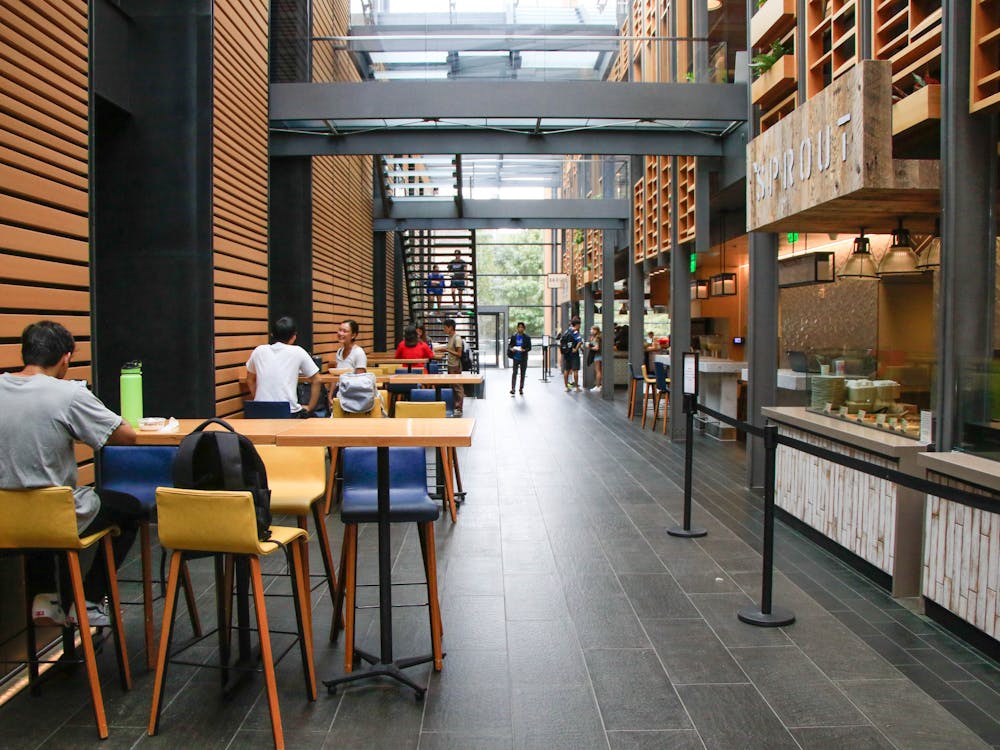In response to rising food prices on campus, Duke’s Karsh Office of Undergraduate Financial Support allocated 300 additional food points per semester to all undergraduate students receiving grant aid in October. While some students say they’re satisfied with the boost, others are frustrated that those not on financial aid did not receive extra points.
Every eligible student, regardless of their current food plan, received the same addition because the Karsh Office wanted to keep an “equity focus,” according to Jax Nalley, a sophomore and vice president of academic affairs for Duke Student Government. Nalley serves on the Karsh Student Advisory Board.
“Considering that I was on 24 food points before the 300 food points hit, I was very much happy,” said first-year Niyat Asefaw, who is on dining Plan I.
First-year Rogelio Miranda Mora agreed with Asefaw. He said that he would often skip out on lunch because of the prices, opting to only eat two meals a day using his swipes at Marketplace.
“I feel like it was a good addition,” Mora said. “Everything is so expensive. It’s nice to have those 300 food points in, knowing we have that cushion.”
Upperclass students shared similar sentiments about the addition.
“Food insecurity shouldn’t be a factor when you’re in college and you have a meal plan,” said Jackie Irvin, a sophomore on dining Plan B.
She added that she would like to see University administrators allocate additional points if the 300 are not sufficient.
However, other students are frustrated by certain aspects of this change, pointing out that students not on financial aid are still affected by Duke Dining’s rising prices.
First-year Jasper Hu, who is an international student not on financial aid, said that his food points were “running out unnecessarily fast.”
Financial resources for admitted international students are limited, according to Duke’s financial aid website. Duke expects to enroll 20-25 international students whose demonstrated need is met with a University-provided need-based aid package.
“I feel like it would be better if international students, or those who aren’t on financial aid, also receive some level of support,” Hu said.
Sophomore Libby Tejeda agreed with Hu, saying that this allocation should have extended to people not on financial aid as well. She has friends not receiving aid that are impacted by rising dining prices.
Katie Kotler, a Duke Student Government senator, said DSG was initially driven by a sense of urgency.
“We needed to at least start with something,” she said, adding that food point equity continues to be “a huge deal” that they will consider in future decisions.
Kotler said that DSG will continue to be receptive to suggestions and concerns from students about the point allocation.
Tejeda also did not think the boost in points would be enough to cover the increased cost of food.
“There was such a big [price] increase in Duke Dining centers,” she said. “Three hundred dollars was a significant amount, but it's going to end up being depleted.”
The 300 food point figure per semester was determined by calculating the difference between anticipated and current dining costs, Miranda McCall, assistant vice provost and director of the Karsh Office, previously wrote in an email to The Chronicle.
Get The Chronicle straight to your inbox
Sign up for our weekly newsletter. Cancel at any time.

Andrew Bae is a Trinity junior and an editor-at-large of The Chronicle's 120th volume.

